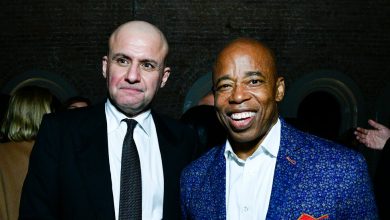Monday Briefing: A Tricky Opportunity in Indonesia


A nickel mining site in North Konawe in Sulawesi, Indonesia.Credit…Ulet Ifansasti for The New York Times
A tricky clean energy opportunity in Indonesia
Indonesia has long sidestepped larger geopolitical conflicts. But now, as it becomes a hub for electric vehicle production, it’s getting caught in the rivalry between the U.S. and China.
At stake is control over nickel, a critical component of E.V. batteries. Indonesia, with the Earth’s largest reserves, is something like the Saudi Arabia of nickel. It is carefully guarding that resource with an export ban on ore: If foreign companies want Indonesia’s raw nickel, they must invest.
The country has drawn more than $14 billion in foreign investment, primarily from Chinese companies. Chinese investment has generated much-needed jobs. But that upward mobility has a downside: pollution and social strife on the island of Sulawesi.
And the U.S., concerned about the influence of China, is refusing to offer Indonesia a trade deal that would mean even more investment and jobs.
I reached out to Peter Goodman, our global economics correspondent, for more insight on the high stakes for Indonesia.
What stood out to you most about the situation in Indonesia while reporting this story?
I hadn’t been in Jakarta for 30 years, since I lived there at the beginning of my journalism career in the early 1990s. It was extraordinary to see how much the city had developed — the emergence of fancy shopping malls with high-end restaurants, new housing, a shiny subway system and the obvious presence of a thriving middle class. But when I got out to the island of Sulawesi, it was equally startling to see how little had changed in communities far from the capital. Here was poverty, limited infrastructure and the willingness to accept horrifying pollution for jobs. Above all, I was struck by the sense of purpose, the designs on taking advantage of the country’s mineral wealth in an age of electric vehicles to advance development.
What’s the biggest difference between the way China and the U.S. are dealing with Indonesia here?
Chinese officials and companies identified earlier than anyone else the strategic importance of nickel in an era of electric vehicles, and the reality that Indonesia possesses critical stocks. They invested quickly and aggressively, unbothered by endemic corruption and loose environmental and workplace safety standards. The U.S., by contrast, was late to appreciate the significance of Indonesia in the electric vehicle supply chain. And even as the Biden administration crafts policy designed to secure American access to critical minerals, other considerations — discouraging Chinese investment, avoiding involvement with environmental destruction and labor strife — are constraining action.
And in China: When Beijing tried to cool its housing market, it created a bigger problem, and fallout from debt-laden developers and sinking sales spread to the broader economy.
Ukraine will get F-16s
The Netherlands and Denmark said yesterday that they would donate F-16 fighter jets to Ukraine — the first countries to do so — in what President Volodymyr Zelensky of Ukraine said was a breakthrough in his nation’s quest to acquire the aircraft considered imperative in the war against Russia.
The jets would enhance Kyiv’s ground-launched air defenses and could deter Moscow by erasing its aerial superiority. Zelensky said the Netherlands would donate 42 jets once Ukrainian pilots and engineers had been trained.
Elsewhere in the war: Ukrainian commanders are more confident now that they’re on the offensive. Despite tough fighting and heavy casualties, they say their forces are in better shape now than just months ago.
A Russian missile slammed into the main square of Chernihiv, Ukraine, on Saturday, killing at least seven people and injuring more than 100, including 12 children, officials said.
Spain claims its first Women’s World Cup
Spain should not have been in contention, my colleague Rory Smith writes. Its finest players spent most of the last year on strike, and a dozen of them were not invited to the tournament as a consequence. The squad that did play was held together by an uneasy truce.
But Spain is champion of the world, sweeping past England, the favorite, to win by a single goal, 1-0. And that’s a testament to an enduring truth of soccer, of sports: Talent can conquer absolutely anything.
THE LATEST NEWS
Asia Pacific
-
A fight over water on the day of the Lahaina fire has shifted the long-running debate over how water is allocated in Hawaii.
-
The head of Maui’s emergency agency resigned last week amid questions about the decision not to sound the emergency sirens as deadly wildfires spread.
-
The oldest plant-eating dinosaur has been found in India.
-
President Biden’s Camp David summit on Friday with the leaders of Japan and South Korea will most likely be viewed by Beijing as provocation.
Around the World
-
A Russian robotic spacecraft that was headed to the lunar surface has crashed into the moon, Russia’s space agency said on Sunday.
-
Egypt pardoned Ahmed Douma, a prominent figure in the country’s Arab Spring revolution, after nearly a decade in prison, his lawyer and state news media said.
-
A Los Angeles man who pleaded guilty in April for his role in a scheme to create fake works by the artist Jean-Michel Basquiat has received probation.
Other Big Stories
-
An examination of confidential correspondence and interviews with people close to Hunter Biden and lawyers involved in his plea deal show how it fell apart.
-
Tropical Storm Hilary made landfall over Mexico’s Baja California Peninsula, bringing floods that could move into Southern California.
-
An unrelated case in Georgia against the superstar rapper Young Thug offers hints as to how the Trump case could play out.
-
Two men who have accused Michael Jackson of sexually abusing them as children can resume their lawsuits against companies he owned, an appeals court ruled.
A Morning Read
Haptic suits have been around for decades, but a new version of the technology, from the company Music: Not Impossible, was developed in part to offer deaf people a better way to experience music. Now the devices are becoming more accessible, even offered at live events.
Music: Not Impossible suits, which wrap around the body, are unique because they turn individual notes of music into specific vibrations, allowing people to feel up to 24 instruments or vocal elements in a song.
ARTS AND IDEAS
A bygone China in miniature
China’s rapid economic growth has meant the demolition of countless rural homes. It has also nurtured nostalgia, inspiring a small but growing community of artists to meet that demand with miniature replicas of homes that were swept away by modernization.
These miniatures “offer a kind of spiritual enjoyment,” said Shen Peng, who took up the craft to give his grandmother a way to revisit the home she’d shared with his grandfather, which was razed by the government.
While designing and collecting miniatures has long been a hobby in the West, it remains relatively new in China: On social media, artists with sizable followings number only about a dozen. But posts about their creations can amass hundreds of thousands of likes, and Shen has 400,000 followers on Douyin, China’s TikTok.
RECOMMENDATIONS
Make this peach galette. It’s sweet and flaky and topped with a wonderful chile kick.
Watch “Zom 100: Bucket List of the Dead,” an irreverent zombie horror film, and four other terrifying delights.
Read one of these nine books that our critics and editors loved.
Listen to one of these 10 gems by the Pretenders, selected by The Amplifier.
Play the Spelling Bee. (If you’re stuck, the Bee Buddy can help.) And here’s the Mini Crossword, Wordle and Sudoku.
That’s it for today’s briefing. See you next time. — Justin
P.S. Take this week’s history quiz.
We’d like your feedback! Please email thoughts and suggestions to briefing@nytimes.com.




